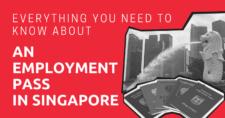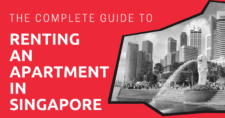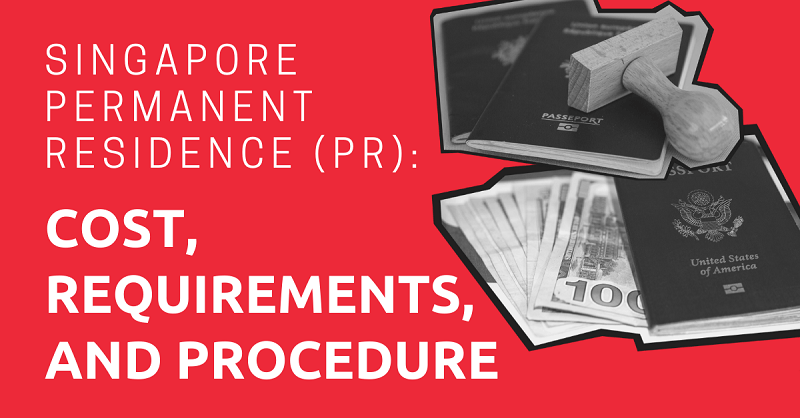
Are you a foreigner living and working in Singapore looking to stay permanently?
If so, applying for permanent residency instead of constantly renewing your work permit or visa may be more beneficial. Permanent residency also gives you more freedom and benefits than work permits like the Employment Pass or S Pass do.
In this article, we’re going to discuss everything you need to know about permanent residency in Singapore, such as the requirements you need to meet, the procedure to follow, the cost, and the advantages and disadvantages.
This article will take approximately 17 minutes to read. Don't have the time right now? No worries. You can email the ad-free version of the article to yourself and read it later!
Disclaimer: This article may include links to products or services offered by ExpatDen’s partners, which give us commissions when you click on them. Although this may influence how they appear in the text, we only recommend solutions that we would use in your situation. Read more in our Advertising Disclosure.
Contents
- Key Takeaways
- What Is Permanent Residency?
- Advantages
- Limitations
- Requirements
- Which Scheme Should I Apply for?
- What Language Do I Need to Speak?
- Quota
- How to Apply for Singaporean PR
- When to Apply
- Where to Apply
- How Much Does It Cost?
- How Long Does It Take?
- Keeping Your Permanent Residence Active
- How to Prepare Yourself for Permanent Residence
- Do I Need to Hire a Lawyer?
- Do I need to be in Singapore to apply for PR?
- Is It Worth It?
- What Happens If My Application is Rejected?
- Now, on to You
Key Takeaways
- Being a permanent resident in Singapore means you’re allowed to work and live in the country for as long as you want, but you don’t have the same rights as Singaporean citizens, such as being able to vote.
- Some of the advantages of applying include being able to leave and enter the country whenever you want, being able to change jobs without needing to apply for a new work permit, and being eligible to apply for citizenship after two years.
- There are strict requirements for becoming a permanent resident, and you typically need to be related to or married to a permanent resident or citizen. You can also apply for residency if you’re working, studying, or investing in Singapore.
- If you want to apply for permanent residency in Singapore using a work scheme, it’s recommended to work here for at least three years before starting your application.
- You can apply for permanent residency completely online after paying a $100 fee per application. Then, you should receive approval or rejection within six months.
What Is Permanent Residency?
Permanent residence, often referred to simply as PR, is a person’s resident status within a country.
In Singapore, being a permanent resident means you’re legally allowed to live in the country for as long as you want, but you’re not a Singaporean citizen, i.e., you’re still a citizen of your home country.
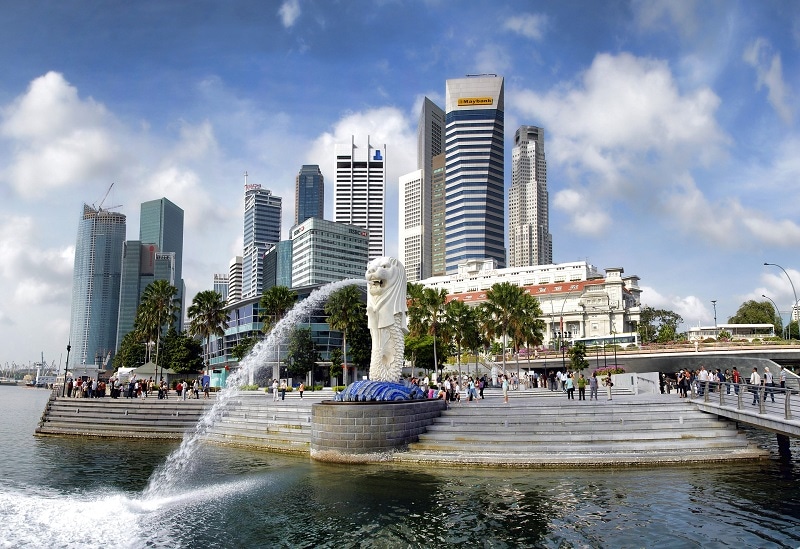
However, being a permanent resident for two or more years makes you eligible to apply for Singaporean citizenship if you’re interested in receiving more rights and other benefits.
Advantages
If you’re not sure whether applying for permanent residence is the best option for you, consider the following benefits of doing so:
- You can leave and enter the country whenever you want.
- You can apply for permanent residency for your spouse and children under 21, as well.
- You can apply for long-stay visas for your parents so they can stay in Singapore for an extended period.
- You will be eligible to apply for Singaporean citizenship after two years of being a permanent resident.
- You can change jobs whenever you want without having to reapply for a new work permit.
- You can contribute to Singapore’s pension system and access the money when you retire.
- You can purchase property in Singapore and apply for more competitive loans that can help you do so.
- You have a higher chance of getting a credit card in Singapore.
- You may have better access to job opportunities as many employers prefer hiring Singaporeans and permanent residents over other foreigners.
- You can enjoy lower rates for public medical services, childcare, and education.
Limitations
It’s important to consider the limitations or disadvantages of permanent residency as well, such as the following:
- If you have sons and apply for permanent residency for them, they need to enlist in Singapore’s military service when they turn 16. They have to serve for two years, which is called National Service. Then, every year, they need to participate in 40 days of Operationally Ready National Service until they turn 40 or 50, depending on their rank.
- As a permanent president, you must contribute to the Central Provident Fund (CPF), a social security savings plan. You can only withdraw your contributions when you retire or if you denounce your permanent resident status. But, the benefit here is that your employer also contributes to your CPF, helping you earn more money.
- As you’re not a citizen, you can’t vote or hold public office.
Requirements
To apply for permanent residence in Singapore, you need to meet one of the following requirements:
- you legally marry a Singaporean citizen or permanent resident
- you are a child of Singaporean citizen or permanent resident, single, and younger than 21 years old.
- you are a parent of a Singaporean citizen
- you need to have an Employment Pass or S Pass for more than six months
- you are a student studying in Singapore
- you are a foreign investor in Singapore
Which Scheme Should I Apply for?
There are different schemes you can choose from to become a permanent resident in Singapore, including the following:
- Professional, Technical Personnel and Skilled Workers Scheme (PTS scheme)
- Global Investor Program Scheme (GIP scheme)
- Unmarried children below 21
- Aged parents of a Singapore citizen
- Foreign Student Scheme (FSS)
Here’s an in-depth look at each scheme to help you choose one that meets your needs and/or fits your profile:
Professional, Technical Personnel and Skilled Workers scheme (PTS scheme)
The PTS scheme is the most popular option for people who want to become a permanent resident because it’s the easiest route.
It involves living and working in Singapore on a work pass, such as an Employment Pass or S Pass, before applying for permanent residency.

The minimum requirement you need to meet is working at least six months in Singapore before applying for PR.
However, your application has a higher chance of being approved if you’ve worked in Singapore longer than just six months.
In general, it’s recommended to stay and work in Singapore for at least two to three years in a row before applying for the Singapore PR.
Here are some other ways to make your PTS scheme application more successful:
- Belong to a niche industry
- Have specialized skills that complement the workforce
- Have qualifications, such as a bachelor’s degree, from a reputable institution
- Be under 50 years old
- Contribute to the community, such as through volunteer work
- Have family ties in Singapore
Global Investor Program scheme (GIP scheme)
If you’re an entrepreneur, the GIP scheme may be a better path to permanent residency. The Singapore Economic Development Board and the Ministry of Manpower created this program to attract investors to conduct business in Singapore.
To apply for this program, you need to have a substantial business track record and a successful entrepreneurial background. If you meet both requirements, you can choose from three investment options:
- Option A: Invest a minimum of $10 million SGD in a new business or the expansion of an existing one.
- Option B: Invest a minimum of $25 million in a GIP-approved fund to invest in a Singaporean company.
- Option C: Establish a Singapore-based single-family office with assets under management of at least $200 million
The application process for permanent residency is different from the other schemes. Instead of applying through the ICA, you apply at the Singapore Economic Development Board under the Global Investor Program.
Unmarried children below 21
If you’re a Singaporean citizen or permanent resident, you can apply for permanent residency on your children’s behalf if they meet these two requirements:
- Under 21 years of age
- Born within the context of a legal marriage or legal adoption
Aged parents of a Singapore citizen
If you’re a Singaporean citizen, you can apply for permanent residence on your aged parent’s behalf. If you’re a Singaporean permanent resident, you can apply for a Long-Term Visit Pass on your parent’s behalf instead.
Foreign Student Scheme (FSS)
Students studying in Singapore can apply for permanent residency on their own if they meet the following eligibility requirements:
- Resided in Singapore for more than two years
- Passes at least one national exam (i.e., PSLE or GCE) or is in the Integrated Programme
What Language Do I Need to Speak?
One of the things that makes Singapore a great place for foreigners is that the country has four commonly used languages: English, Mandarin, Malay, and Tamil.
Malay is the national language, but most business is conducted in English.
If you speak one of the four languages, you won’t have any trouble applying for permanent residence and living in Singapore.
Quota
Getting permanent residence in Singapore is quite competitive because it’s a small country with many expats.
The Singapore government has a quota of 30,000 to 35,000 people being approved for permanent residency each year.
While the quota can make it harder to get approved, if you get rejected, you can always try to reapply the following year.
How to Apply for Singaporean PR
If you’re interested in applying for permanent residency on your own behalf or for a family member, here’s how you can do so:
The first step is completing the application form online. Start by logging in to your MyICA account on the Immigration and Checkpoint Authority (ICA) website.
Then, access e-services to start the application. It will prompt you to upload the necessary documents. The documents you need to include vary depending on the type of application you’re completing. For example, if you’re an EP holder, you’ll need to submit documents different from those of a foreign student.
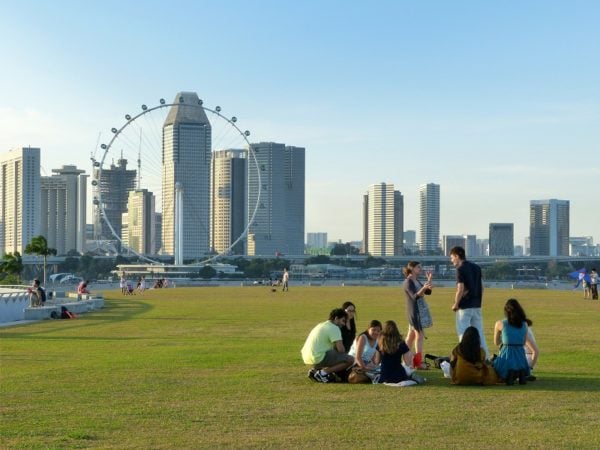
Check the Immigration and Checkpoint Authority website for a detailed document list.
Note that one document that every type of applicant needs to upload is a copy of their passport. Your passport needs to be valid for at least six months from the time of your application. Otherwise, your application will be rejected.
Another important thing to remember is that all your documents must be in English. If they’re not, you’ll need to get them translated.
The ICA only accepts translations from the following sources:
- The embassy of the country that issued the document
- A notary public in Singapore
- Private translations attested by the embassy that issued the document or notarized by a notary public in Singapore or the country that issued the document
If you don’t include the correct, translated documents, your application will likely be rejected. So check everything thoroughly before submitting your application.
Once you start the application, you must submit it within seven days or it will be discarded. We recommend compiling all your documents and information before starting the application process so you can complete it on time.
The ICA may take up to six months to process your application. The good news is that you likely won’t need to do anything else. Unlike in other countries, you typically don’t need to go through an interview during the permanent residency application process. All you’ll need to do is wait.
If your application is approved, you’ll receive a letter informing you of that outcome and telling you about the next steps you’ll need to take. You can also check your status only through MyICA or the ICA e-service.
Normally, you just need to make an appointment online to visit the Permanent Resident Services Centre in Singapore so you can receive your ID card and pay any outstanding fees.
When to Apply
There’s no application period for permanent residency in Singapore — you can apply whenever you want.
If you’re already in Singapore and your visa or work permit is expiring soon, apply for permanent residency sooner rather than later, as the process can take months.
Where to Apply
You can apply for permanent residence through Singapore’s Immigration and Checkpoints Authority’s website here.
Following the link, you’ll complete the entire application form online by answering a few questions and uploading the necessary documents.
If you prefer to handwrite the application, you can download it to your computer, print it out, fill it in, and then upload it on the same website.
You can’t submit your application in person, so if you don’t have a computer or access to the internet at home, consider visiting a library or other public space to submit your application online.
How Much Does It Cost?
There’s a $100 SGD processing fee that each applicant must pay to submit their permanent residence application.
For example, if you want to apply on behalf of yourself, your spouse, and your two children, you need to pay $400.
This application fee is non-refundable, even if you decide to withdraw your application, so ensure you’re ready to apply before you pay.
Then, if you’re approved, each person needs to get a re-entry permit to leave and re-enter the country, which costs $20. Each applicant also needs an identity card, which also costs $50.
You can pay online using Visa, Mastercard, American Express, Direct Debit, or PayNow.
How Long Does It Take?
Every application is different, but the Immigration and Checkpoints Authority typically takes six months to process permanent residence applications.
If you forget any documents or your application is complex, it may take longer than six months to process.
You can stay up-to-date with the status of your application through MyICA or the e-service where you originally applied.
Don’t try to reapply while your application is still active, as you’ll be automatically rejected.
In some cases, you may be asked to provide additional information, extending the processing time of your application.
Keeping Your Permanent Residence Active
Your permanent residence status doesn’t expire, but to uphold it, you always need a Re-Entry Permit (REP) when you leave the country.
You’ll receive this permit when you receive your permanent residency. If you leave the country without it and remain overseas, it expires, and your permanent residency status will be revoked.
If you try to enter Singapore without the permit, you’ll be considered a foreign visitor, which means you’ll have to leave after 30 days.
So, always keep your re-entry permit with you when you leave. It typically expires every five years, but you can easily renew it online after paying a $50 SGD fee.
To maintain your re-entry permit, you need to pay a $10 fee every year.
Otherwise, to maintain your permanent residence status, ensure you follow all Singaporean laws and contribute to your Central Provident Fund.
How to Prepare Yourself for Permanent Residence
As applying for permanent residence is a long process, it’s important to prepare for it ahead of time.
Consider strengthening your application by developing new skills, furthering your education, or completing volunteer work.
Developing stronger relationships with people in your community can also be beneficial as you may need to include references in your application.
When you’re ready to apply, prepare copies of all your documents ahead of time to ensure you’re not missing any. If you are, your application could be delayed.
Do I Need to Hire a Lawyer?
Hiring a lawyer to complete your permanent resident application is not necessary but can help make the process easier.
A lawyer will prepare all your documents, complete your application form, submit it, and update you regularly on your status.
This can make the process less stressful and improve your chances of being approved for PR.
However, applying for permanent residency isn’t overly complicated and the Immigration Checkpoints Authority even offers a step-by-step guide for applying to help make it easy for you.
So hiring a lawyer is completely up to you.
Do I need to be in Singapore to apply for PR?
As the application for permanent residency is done online, you don’t need to physically be in Singapore when you complete it if you’re on vacation or visiting your home country.
However, having a residential address in Singapore is mandatory for the application, so you must have spent time in Singapore before applying for PR.
Is It Worth It?
If you plan to live in Singapore long-term, applying for permanent residency is totally worth it. You’ll never have to apply for or renew a work permit or visa again.
The application process is quite simple, and you can complete it all online. It’s also affordable as there’s only a $100 SGD application fee, so you don’t have anything to lose when applying for PR.
What Happens If My Application is Rejected?
Singapore is known to have low approval rates for permanent residency. This is because there are many applicants and strict criteria everyone must meet to be accepted.
So, if you’re rejected, try not to be too upset. You can appeal the verdict if you think the ICA made a mistake. Or you can reapply six months after your initial application.
Try to strengthen your new application to increase the chances of it being approved. The ICA considers the following themes when assessing your application:
- Employment history
- Vocation upskilling
- Formal education
- Financial records
- Community involvement
- Existing family ties
Focusing on improving one of these themes, if possible, can help strengthen your application when re-applying for permanent residency.
There’s no limit on the number of times you can reapply, so whenever you have a significant change in your finances, education, or employment, consider reapplying. But if there are no changes to your application, it will be rejected again, so focus on strengthening your skill set.
Now, on to You
We hope this comprehensive guide answered any questions you had about applying for permanent residency in Singapore.
If you have any question, please feel free to ask using the comment form below.




